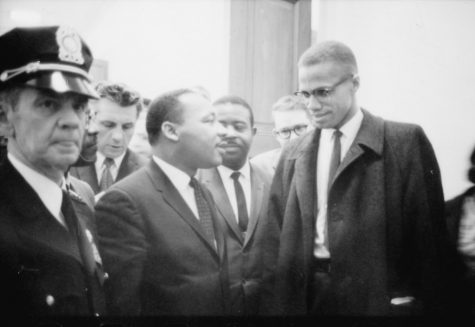Felicity Huffman’s Sentencing Causes Controversy
BOSTON, MA – SEPTEMBER 13: Felicity Huffman, right, and her husband, William H. Macy, walk out of John Joseph Moakley United States Courthouse in Boston, MA on Sept. 13, 2019. Huffman was sentenced to 14 days in prison and community service for her role in the college admissions scandal. (Photo by Nic Antaya for The Boston Globe via Getty Images)
November 5, 2019
Controversy regarding the heavily-covered college admissions scandal has provoked questioning of the U.S legal system. Multiple celebrities, including Full House’s Lori Loughlin and Desperate Housewife’s Felicity Huffman, were caught spending hundreds of thousands of dollars to guarantee their childrens’ acceptance into colleges such as Yale, UCLA, and Georgetown, and some of the sentencings have been in the news lately – for the wrong reasons.
Huffman was recently released from an 11-day jail stay after pleading guilty to paying $15,000 to raise her daughters SAT scores. While her crime was not the most severe out of the bunch, with Lori Loughlin paying $500,000 to get her daughter in on a rowing scholarship, many still believe that her sentence was extremely short for her wrongdoing. Along with this, she was held in the Federal Correctional Institution in Dublin, California, which has a reputation for being one of the most easy-going prisons in America. Huffman’s situation has been under scrutiny for other reasons, as it has been compared to a Black young man’s experience with the same sentencing – for quite a different crime.
Deandre Somerville of West Palm Beach, Florida made headlines for his court-ordered ten-day jail stay, 150 hours of community service, a year of probation, a $233 fine, and a 100-word written apology: all for oversleeping and missing jury duty. The 21 year-old man was clear of a prior criminal record, works with children in a recreational center, and was genuinely remorseful for his actions – but he served a higher consequence than Huffman, someone who stole a spot from another, hardworking student at the school she paid for her daughter to attend. Although Somerville’s “moving” letter, according to the judge, was worthy of removing his jail time off of his criminal record, he still spent those ten days in jail… and has 30 hours of community service, 3 months of probation, and a hefty fine ahead of him.
Similarly to Somerville’s case, Ohio mother Kelley Williams-Bolar was jailed for 10 days after using her father’s address to get her kids into a better neighborhood school. In an attempt to enroll them through a different schooling zone, she apparently violated a law she wasn’t aware existed. Although she had harmless intentions, she was still sentenced, and was additionally charged with 3 years probation and a $70,000 fine. These harsh consequences compared to the College Admission Scandal seem absurd, but when race and economic status is taken into consideration, it gives this situation context.
Felicity Huffman is a wealthy, famous white woman, while Kelley Williams-Bolar, like Somerville, is Black and middle-class. Their crimes were starkly different, yet their sentences were almost exactly the same, and this shines light on the legitimacy of the American justice system. When comparing these cases, it is evident that Huffman’s racial, societal, and economical privilege is reflected in her “cushy” punishments, while Somerville and Williams-Bolar got the short end of the judge’s gavel. This realization, which has been made in many cases throughout American history, makes one question how much power a judge’s personal prejudices and opinions have on convictions across the country. Although it should have no place in our legal system, these cases make privilege seem like the most powerful factor in one’s punishment.













